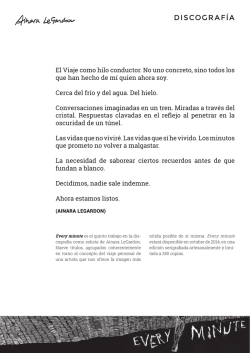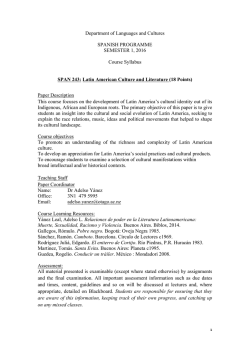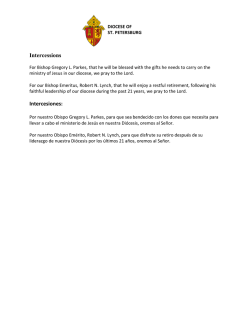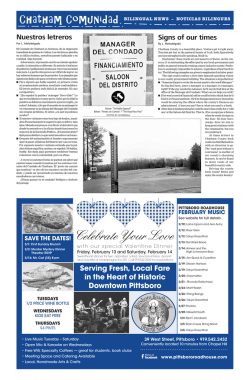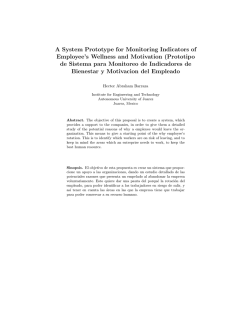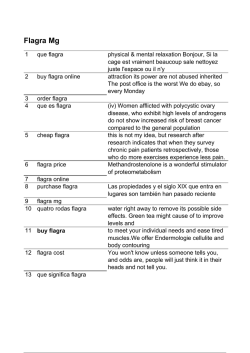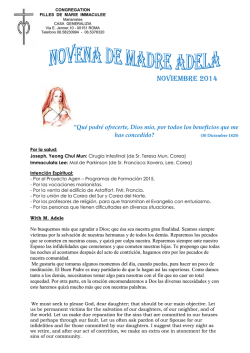
From the President - Latin American Studies Association
From the President by Joanne Rappaport | Georgetown University | [email protected] I had promised to dedicate this column to grassroots research institutions in Peru, but the election of Donald Trump to the presidency of the United States forces all of us—whether we are based in the United States, in Latin America, or in other countries—to do some serious thinking about our role as Latin Americanist scholars over the next four years. I wasn’t sure how to approach the subject in this column. I could talk about how the Trump election fits into a pattern in the hemisphere: the 2009 coup in Honduras, the 2012 coup in Paraguay, the 2015 election of Mauricio Macri in Argentina, the impeachment of Brazilian president Dilma Rousseff just a few months ago. Certainly, the social scientists in our Association will be analyzing these developments at the upcoming Congress and in the pages of LARR. In the interests of a diálogo de saberes, this may be a moment at which our U.S. members learn to listen more closely to our members in Latin America, who will be able to share significant insights, not only on how to study such political phenomena, but also how to survive them. I could, alternatively, reflect on the impact of a Trump presidency on the future of our warming planet, an issue that was highlighted in an excellent dossier on environmental justice and climate change in the fall issue of LASA Forum. Likewise, LASA members, including two international teams of scholars and activists awarded Ford-LASA Special Projects grants last fall, are conducting vital research on race and gender, two very obvious challenges we will have to meet, whether in the United States or in Latin America, over the next four years of a Trump presidency. In just the past couple of days, female students in hijab were threatened near the Georgetown University campus where I teach, and this is just one of many instances of violence or threats of violence that are taking place in the United States today, with Latinos, among others, as their targets. I teach at an institution of higher education which, like many other universities in the United States, has opened its doors to students who came here undocumented as children; many of these young people were granted temporary status by the Obama administration. They are now terrified that a Trump administration could potentially deport them to countries they do not even know. Students and faculty across the United States are working to turn their universities into sanctuary campuses, safe places for undocumented students. In the bigger picture, Central American families are still fleeing their homes to escape escalating violence, many of them attempting entry into the United States. The question of how the U.S. government will treat the millions of undocumented immigrants, a large number of whom are from Latin America, is, indeed, an existential question for an organization like ours, which is dedicated to the study of the region. In fact, it should already have been a fundamental question, given that President Obama has deported more than two million people during his two terms in office, a large number of them Latin Americans. It doesn’t matter if you are a political scientist based in Argentina, a filmmaker in Mexico, a historian in the United States or Canada, an environmental activist in Honduras, or a literary scholar in Europe or Asia: what is happening to Latin American immigrants in the United States is not an isolated phenomenon. Is intimately linked to events and historical processes in Latin America that have propelled these people to seek refuge in the United States. In this sense, it would be erroneous for us to separate this as an issue of interest exclusively to Latino Studies scholars, or to faculty and students at U.S. universities. We are one community on both sides of a border or the multiple borders that we are continually forced to cross. What does that mean for LASA as a community of teachers, researchers, and activists? Of course, it is up to each individual to decide whether she or he will work in solidarity with these immigrants, whether on U.S. campuses, in the broader North American society, or in their countries of origin. However, here I want to dwell on the scholarly angle. I believe that the first step we must take is to recognize that U.S. Latinos are part of Latin America, that this is not a separate scholarly issue that we can ignore in our pursuit of Latin American studies. The work being done in U.S. Latino studies is relevant for those of us working south of the U.S.-Mexico border, whether we live and work in the United States or in other countries. In the interests of a deeper diálogo de saberes, we need to engage with this scholarship, both in our reading and in our participation in professional meetings such as LASA2017 in Lima. To that end, we have decided to introduce a closing ceremony to the Congress, which will focus on questions of justice and immigration, and which we hope will provide a counterpart to the opening ceremony, at which Peruvian liberation theologian Gustavo Gutiérrez will be a keynote speaker and AfroPeruvian musician Susana Baca will perform. We hope that as you make your travel plans for Lima, you will seriously consider staying for this event—after all, the Congress only last three days. We are 1 lasaforum winter 2017 : volume xlviii : issue 1 D E B AT E S Procesos de paz en América Latina Mauricio Archila, coordinador also planning a dossier for a future issue of the LASA Forum. Our Latino Studies Section members ask for more than simple interest in their work. They implore us to consider the ways in which Latin Americanists in both the global North and South can begin to incorporate Latino communities into our research, so that those of us who work as ethnographers with indigenous communities in Mexico recognize that these villages have counterparts in Los Angeles, as one of the first Otros Saberes projects did; and so that social scientists studying social movements and political developments in Ecuador, El Salvador, Brazil, and elsewhere incorporate into their thinking the existence of colonies of these populations in the global North, many of whom are living under the shadow of deportation or violence at this moment in the United States. This is, perhaps, a very big thing to ask. I hope, however, that the mere suggestion will push us to think about how Latino studies and Latin American studies are one and the same, and how we can begin to admit Latino studies into our broader diálogo de saberes. 2 Procesos de paz en América Latina: El reciente caso colombiano por Mauricio Archila | Universidad Nacional de Colombia | [email protected] Después de seis años de negociación, dos de carácter secreto y cuatro en forma abierta en La Habana, el estado colombiano y las FARC-EP (Fuerzas Armadas Revolucionarias de Colombia, Ejército del Pueblo) firmaron un acuerdo de paz el 26 de septiembre del año en curso en la ciudad de Cartagena. Los seis puntos acordados con la guerrilla más antigua del continente fueron: reforma agraria integral; participación ciudadana; fin del conflicto; cultivos de uso ilícito; víctimas, verdad y justicia transicional; y procedimientos para implementar el acuerdo. Unos días después, el domingo 2 de octubre, fue convocado el pueblo a refrendarlos por medio de un plebiscito en el que inesperadamente ganó el NO por pequeño margen de menos del 1 por ciento, aunque en realidad la triunfadora fue la abstención cercana al 65 por ciento del potencial electoral (ver artículo de Marco Palacios en pasado LASA Forum). Este impase se intentó superar abriendo un amplio diálogo con los voceros del NO, quienes propusieron unas 400 modificaciones que se negociaron nuevamente con las FARC-EP, fruto de lo cual surgió un nuevo acuerdo que incorporaba muchas de esas sugerencias, salvo algunas que eran innegociables como impedir la participación política de los desmovilizados y someterlos a detención carcelera como si hubieran sido derrotados en combate. Los nuevos acuerdos se volvieron a firmar el pasado 24 de noviembre y en el curso de la siguiente semana fueron refrendados por el Congreso, con la férrea oposición de los del NO, que no sintieron recogidas sus inquietudes. Se inicia ahora la larga disputa por su implementación, y se vislumbra desde ya que las elecciones de 2018 serán el escenario final de ratificación de los acuerdos que pondrán fin a más de 50 años de guerra. Sobre tal telón de fondo, LASA Forum con este dossier quiere reflexionar sobre el significado de la paz en Colombia de cara a algunas experiencias en el continente, en especial las de Guatemala y El Salvador. En particular la primera arroja muchas lecciones preocupantes para el futuro de la paz en Colombia. Igualmente recibimos contribuciones que exploran aspectos jurídicos, étnicos y de género de los acuerdos firmados en La Habana.
© Copyright 2026
